

China has signed and ratified key human rights treaties. As a state party, China is obligated to implement the treaties, submit progress reports to the expert committees overseeing implementation, and undergo periodic reviews by these committees. These treaties include:
- Convention against Torture and Other Cruel, Inhuman or Degrading Treatment or Punishment (CAT): EN, CH
- International Covenant on Civil and Political Rights (ICCPR, applicable to the Hong Kong SAR but not mainland China): EN, CH
- International Convention on the Elimination of All Forms of Racial Discrimination (CERD): EN, CH
- Convention on the Elimination of All Forms of Discrimination against Women (CEDAW): EN, CH
- Convention on the Rights of Persons with Disabilities (CRPD): EN, CH
- Convention on the Rights of the Child (CRC): EN, CH
- International Covenant on Economic, Social, and Cultural Rights (ICESCR): EN, CH
Each review cycle begins with the submission of a progress report by China. HRIC contributes to these review cycles by providing input into the Lists of Issues (LOIs) that Committees prepare following China’s submission of its progress reports; making submissions in advance the reviews raising our concerns and presenting our analyses and recommendations; participating in briefings with Committee experts; monitoring the reviews; and providing additional information to the experts.
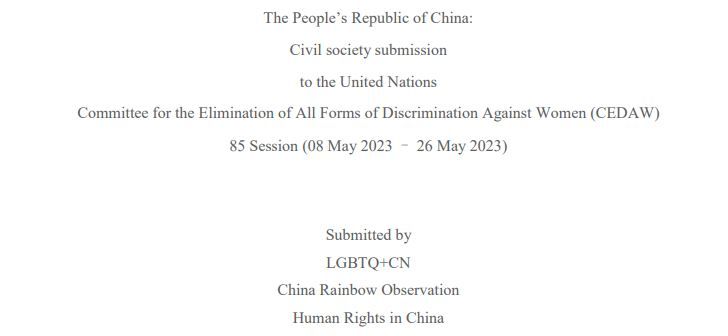
Women's rights are human rights. Despite China's signature on the Convention on the Elimination of All Forms of Discrimination Against Women (CEDAW), Chinese women still cannot enjoy human rights on an equal footing, especially lesbian, bisexual, and transgender women. They face serious discrimination and human rights challenges in China. Their intimate relationships lack legal protection, and they cannot enjoy equal access to healthcare. The United Nations will review China's implementation of the CEDAW in May 2023, in Geneva. Human Rights in China (HRIC) and two Chinese LGBTQI organizations have jointly submitted a report to the CEDAW Committee of the United Nations, offering comments and suggestions on China's implementation of the Convention. For more information, please refer to the report.
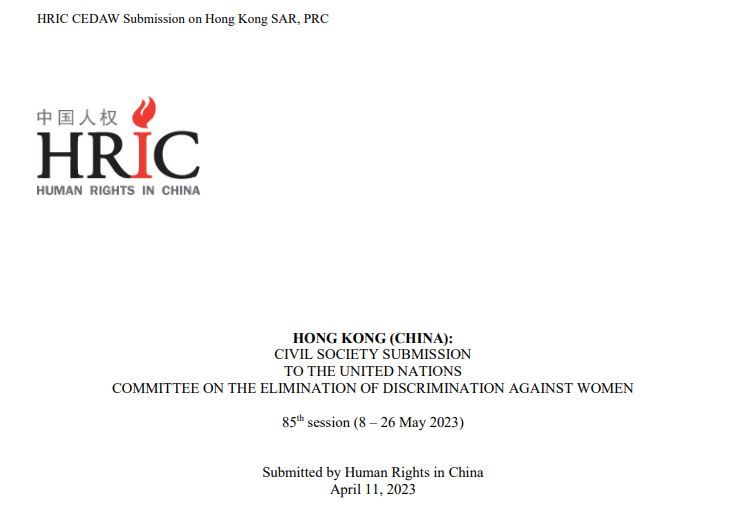
The UN Women's Rights Committee's 9th review of China, HK & Macau is happening tomorrow! HRIC's submission focuses on online gender-based violence against women in HK, calling for a review of existing legislation, robust social policy planning & enhanced public education.
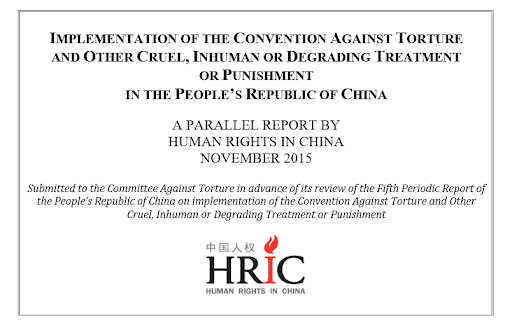
HRIC’s submission focuses on three core structural challenges and the respective issues hampering the effective implementation of the Convention Against Torture and Other Cruel, Inhuman, or Degrading Treatment or Punishment by China: independent monitoring, access to information, and access to justice.
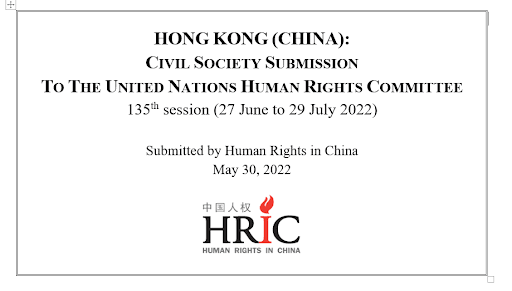
HRIC’s submission focuses on issues relating to Hong Kong after the implementation of the National Security Law: (1) constitutional and legal framework within which ICCPR is implemented; (2) right to life, prohibition of torture, and liberty and security of the person; (3) freedom of expression; (4) peaceful assembly; (5) freedom of association; and (6) participation in public affairs.
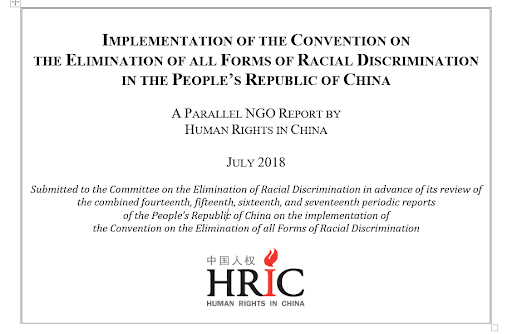
HRIC’s submission focuses on three key areas of concerns: (1) limited disaggregated information and information on implementation and impact hampering an assessment of the efficacy of legislative and policy measures in addressing discrimination; (2) the lack of a comprehensive definition of discrimination; and (3) significant legislative, policy, and institutional developments 2013-2018 presenting obstacles to the effective implementation of a rule of law.
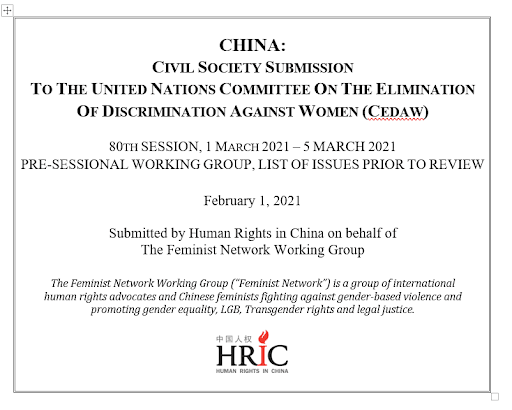
HRIC’s submission on behalf of the Feminist Network Working Group focuses on: (1) the high Sex ratio at birth and practices of gender-biased non-medical needs fetal sex identification and sex-selective artificial termination of pregnancy and (2) concerns regarding legal protection of girls and women against domestic violence.
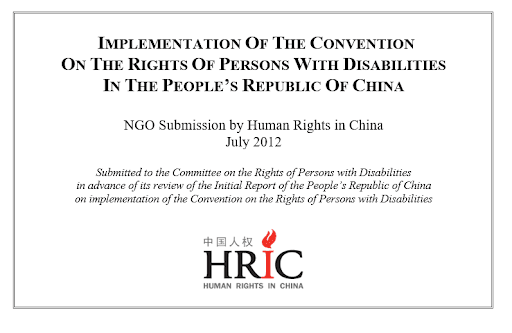
HRIC’s submission focuses on: (1) the role of civil society organizations within the PRC regulatory and political framework; (2) challenges presented by the PRC’s State Secrets Law and regulations; (3) rule of law challenges in the PRC and impact on ensuring liberty and security of the person; and (4) definition of discrimination and anti-discrimination provisions in relevant PRC laws and impact on monitoring, data collection, and development of effective measures and assessment of these measures.
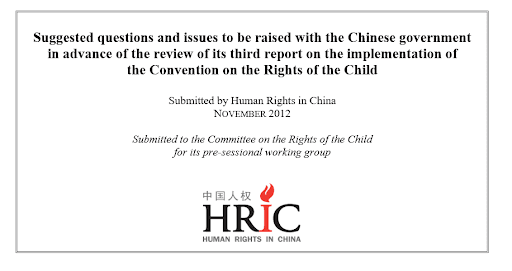
HRIC’s submission highlights two overarching issues that impact the reporting and monitoring of the China’s obligations under the Convention on the Rights of the Child: (1) the availability of Relevant Data and Information, where the primary source of limitation is the State Party’s elaborate States Secrets System; (2) opportunities for civil society participation under China’s restrictive regulatory framework for CSOs.
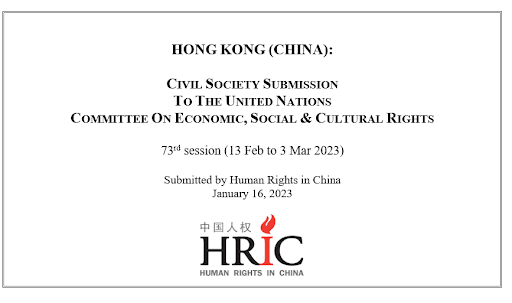
HRIC’s submission focuses on key concerns regarding the implementation of the right to education and government measures post-National Security Law that undermine academic freedom in Hong Kong: (1) “patriotism” versus critical thinking, (2) securitization of education, (3) politicization of education, and (4) COVID’s impact on academic freedom.